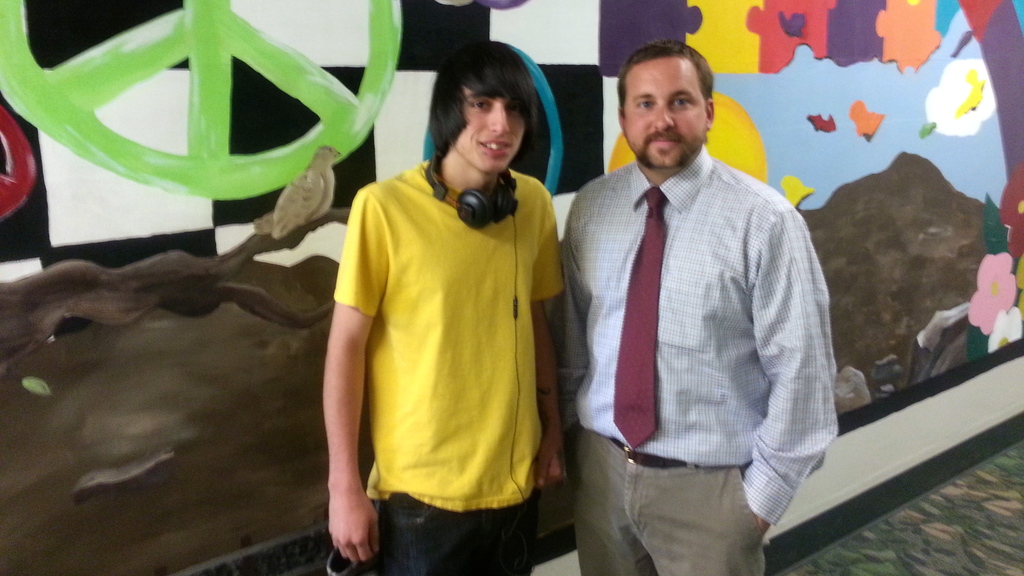Four years ago, Romeo Rivera wouldn’t have even imagined he could graduate from high school a year early.
He got in trouble and said he didn’t have confidence in his abilities in reading, writing or math.
“I was really insubordinate all the time,” Rivera said. “I always missed school and I didn’t get good grades.”
But on Monday, Rivera beat his own expectations when he graduated from Canyon Springs Alternative High School in Caldwell after three years in high school.

Following his graduation, Rivera credited much of his turnaround to the year he spent at the Caldwell Freshman Academy. Rivera was part of the school’s first class of 90 students – 16 of which graduated a year early this year.
“I’ve been through a lot with school and it was really emotional to know I made it after all the time and all the problems I’ve been through,” he said.
Principal Jacob Skousen said the freshman academy is unique because of its mission to help the district’s most at-risk students succeed. Most of the school’s students were selected to attend the school in eighth grade by their teachers, counselors and principals.
Some have attendance or discipline problems.
Around 90 percent of the families deal with poverty.
And about one-third of the students’ parents are monolingual Spanish speakers.
“You could write the book on at-risk criteria based on some of these students’ files,” Skousen said. “I don’t think many people would have put their money on them (succeeding).”
But Skousen and the eight Caldwell Freshman Academy teachers bet on them in a big way.
Before the school year begins, Skousen and his wife drive to every student’s home and meet with the family. Skousen, who speaks Spanish, talks to parents about goals and expectations.
He promises them the staff will advocate for their children and help them succeed.
In response, some parents practically laughed at the unexpected visitor.
“You can imagine their reluctance,” Skousen said. “But I said: ‘You know what? This will be the best experience your child has ever had and you can thank me later.’”
From Day One, the academy is different. Half of each day during the first week is devoted to team building and communications skills. Students participate in ropes courses and leadership exercises.
Students help paint murals in the hallways and draw silhouette pictures of their classmates paired with adjectives describing their new friends.
Students adhere to a dress code, which is designed to limit distractions based on what brand a student wears.
Textbooks don’t leave the classroom and students don’t have traditional homework assignments. Instead, an assignment might be to discuss Newton’s laws of physics with an adult at home, then report back about the discussion the next day.
Skousen said the reason some students had been failing was because they didn’t bring books or assignments back to class the next day.
If there are no books to lose or homework assignments to blow off at home, then there are fewer reasons to fail students, he said.
“We learned we can only control what we control,” Skousen said. “So if the books stay in the classroom there is nowhere for them to get lost.”
Additionally, classes are 90 minutes, twice as long as students are used to.
English and humanities teacher Sally Gonser said she loves the philosophy at Caldwell Freshman Academy. The longer class periods allow her to go deeper with instruction. She said at other schools she taught at, it might take students 15 minutes to clam down and get settled in and start paying attention. During a 45-minute class, that’s one third of the instruction time.
She also stressed that a different approach to homework does not mean the school goes easy on students.
For one thing, no D’s are given. Students must earn a 70 percent or better to pass the classes.
“I would compare anything we do in my class to any high school English class,” Gonser said. “It’s every bit as strenuous.”
Smaller class sizes also make a difference. English teacher Betty Riley said class sizes average 12-15, not 30-35 like other schools. To Riley, that means students can’t fall though the cracks by choosing to “hide” and remain quite, hoping the teacher won’t call on them and find out they are behind.
“Nobody gets to hide in a corner here because every teacher knows them so well,” Riley said.
Students like Rivera were able to graduate a year early because they can earn 16 credits in a quarter system instead of 12 in a semester year at Caldwell Freshman Academy. After one year at the academy, many students go on to Canyon Springs Alternative High School, where they can also earn 16 credits a year.
Skousen said that calendar allows some degrees of flexibility if students fail a course or two, leaving them time to still graduate within the traditional four-year cycle.
But because 46 credits are required to graduate high school, students who pass every classes earn their diplomas a year early.
For Rivera, nothing magical changed on his first day at Caldwell Freshman Academy. He fully admits that he was skeptical, that he would have rather attended Caldwell High School. He also said he and Skousen butted heads during the middle of that year.
This week, the two talked about the experience.
Skousen, to Rivera: “Thinking back on it, did you think that I believed in you, that I believed you could actually succeed and do well in spite of that?”
Rivera smiled. Despite their earlier disagreements, he remembered the end of his freshman year, when he brought Skousen his yearbook and the principal scrawled a lengthy paragraph in Rivera’s book with a personal message of encouragement and friendship.
Rivera to Skousen: “I think you did, you were always here and when I did something bad you worked it out with me.”
